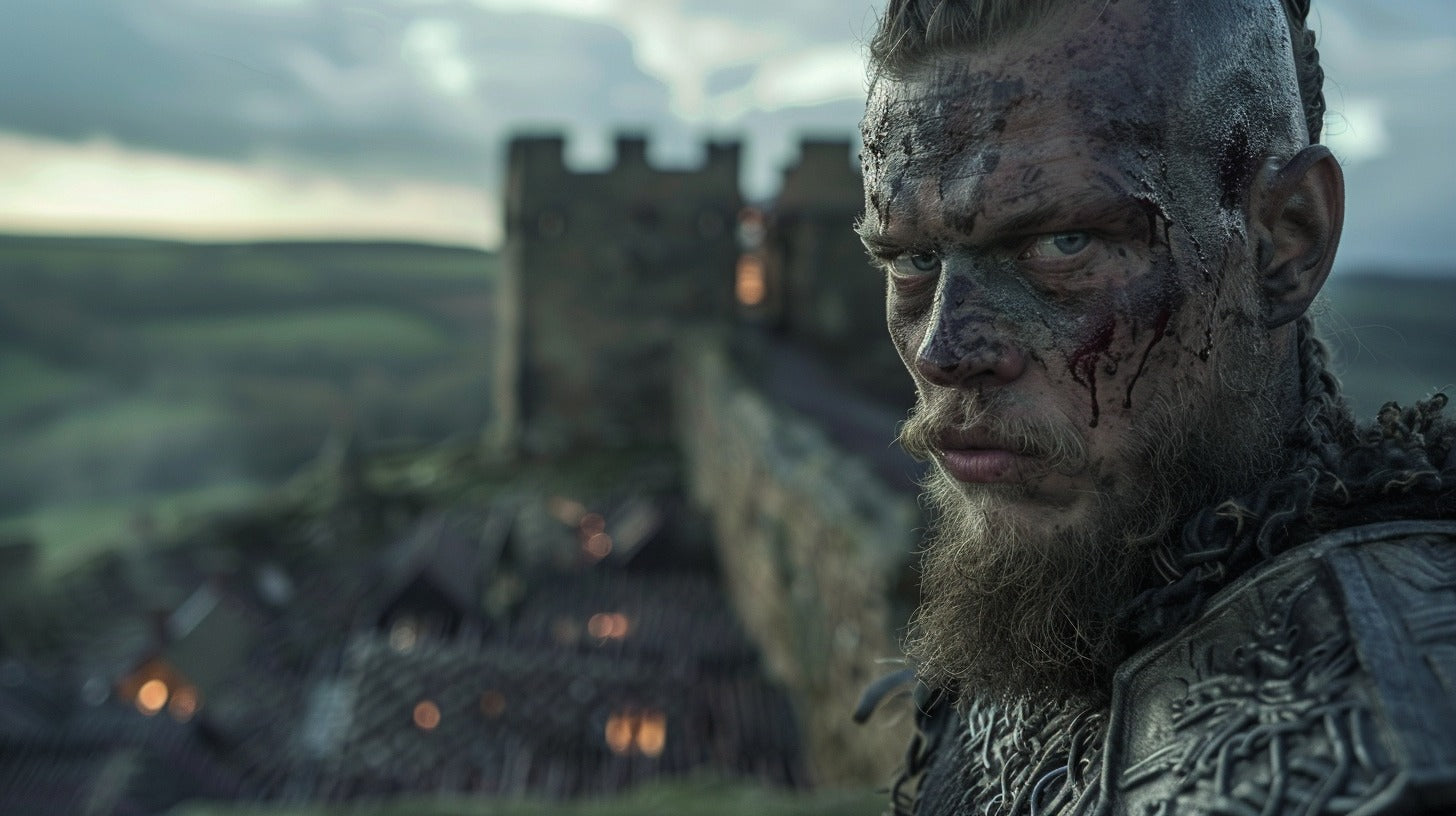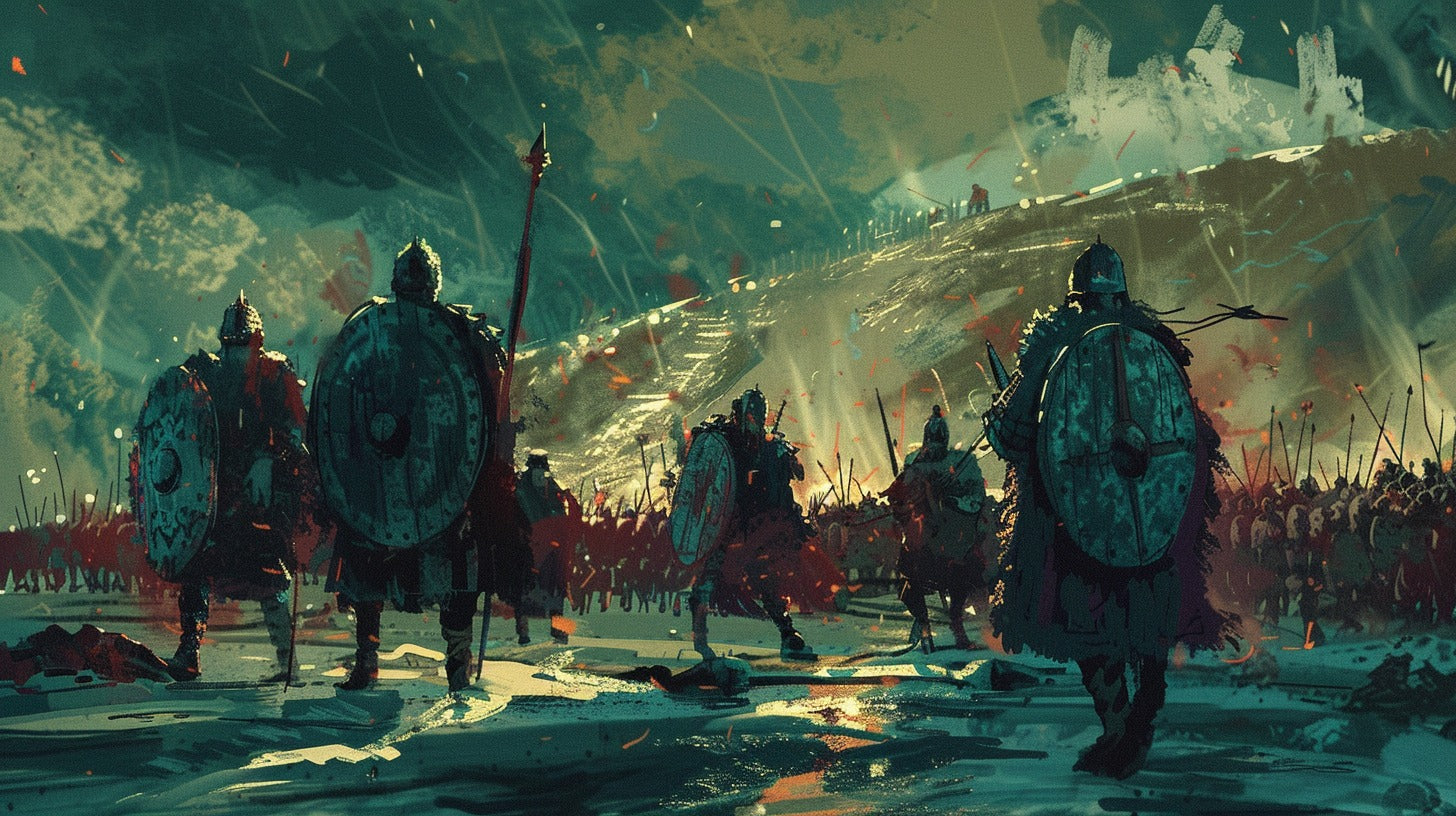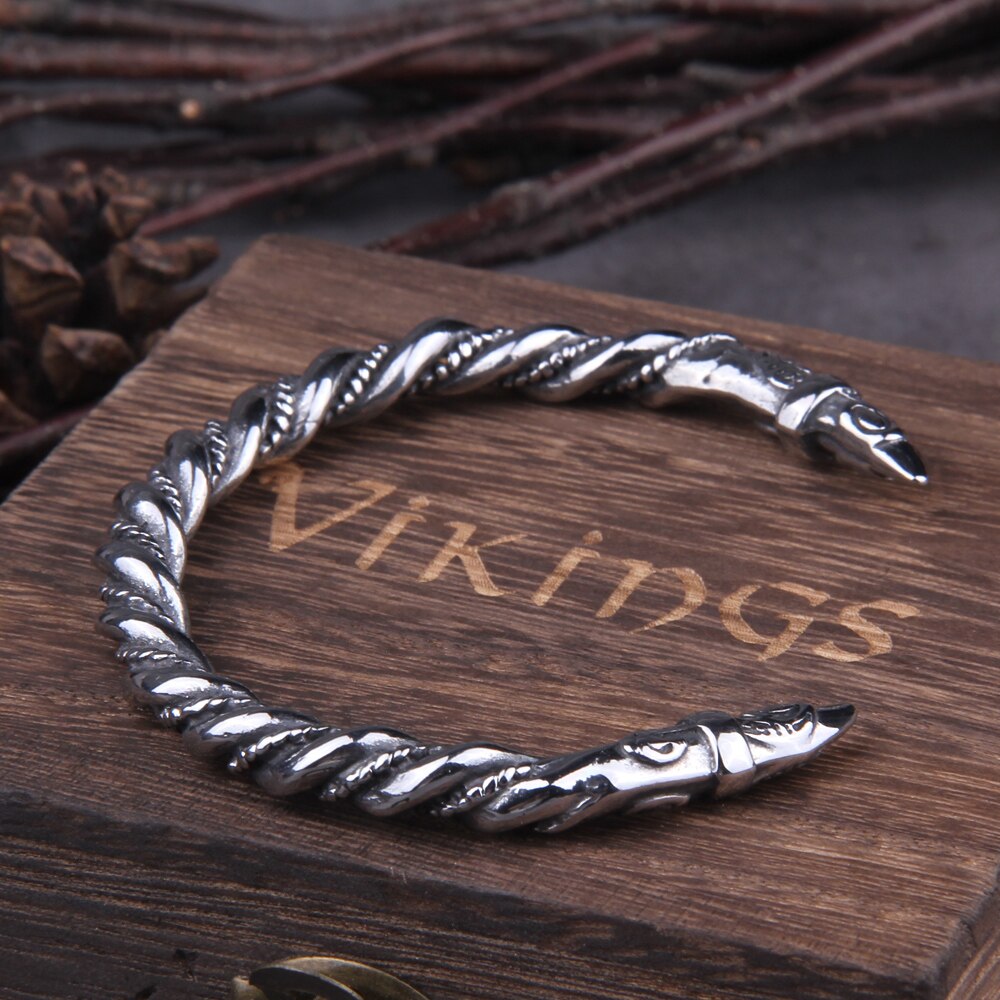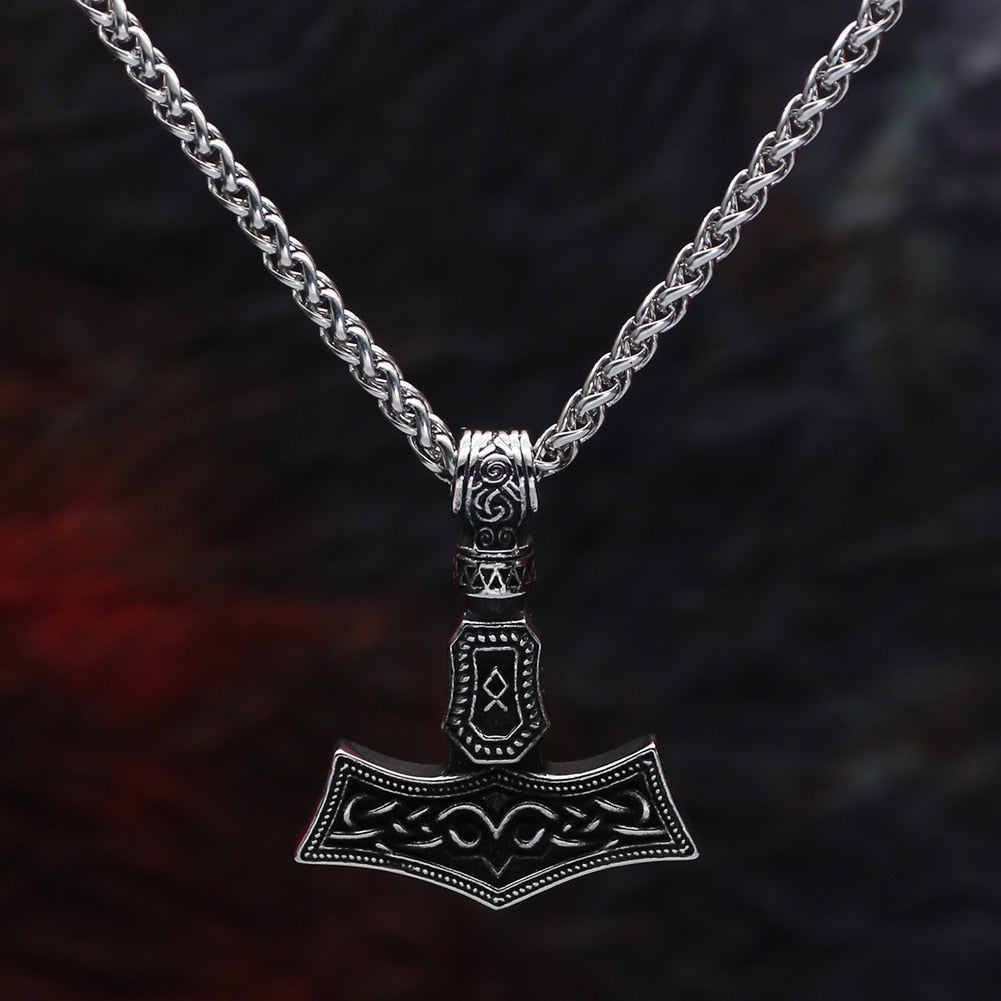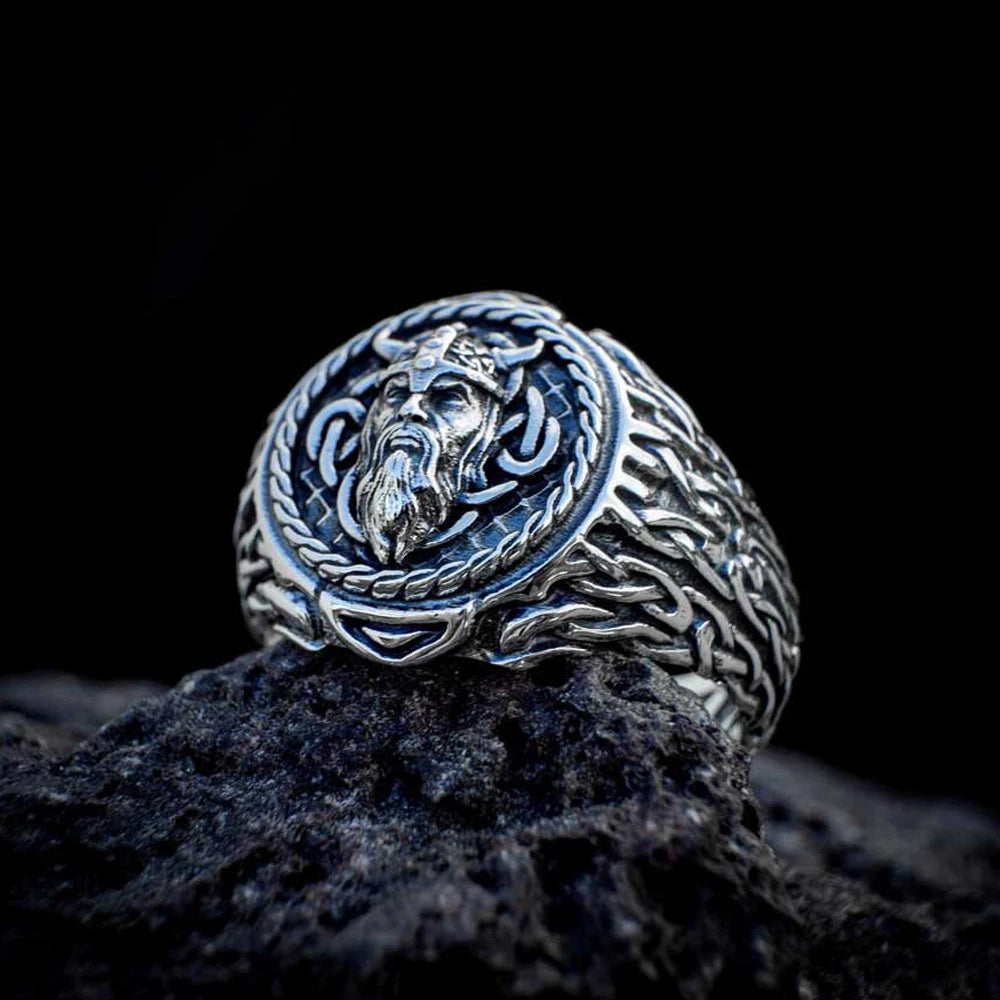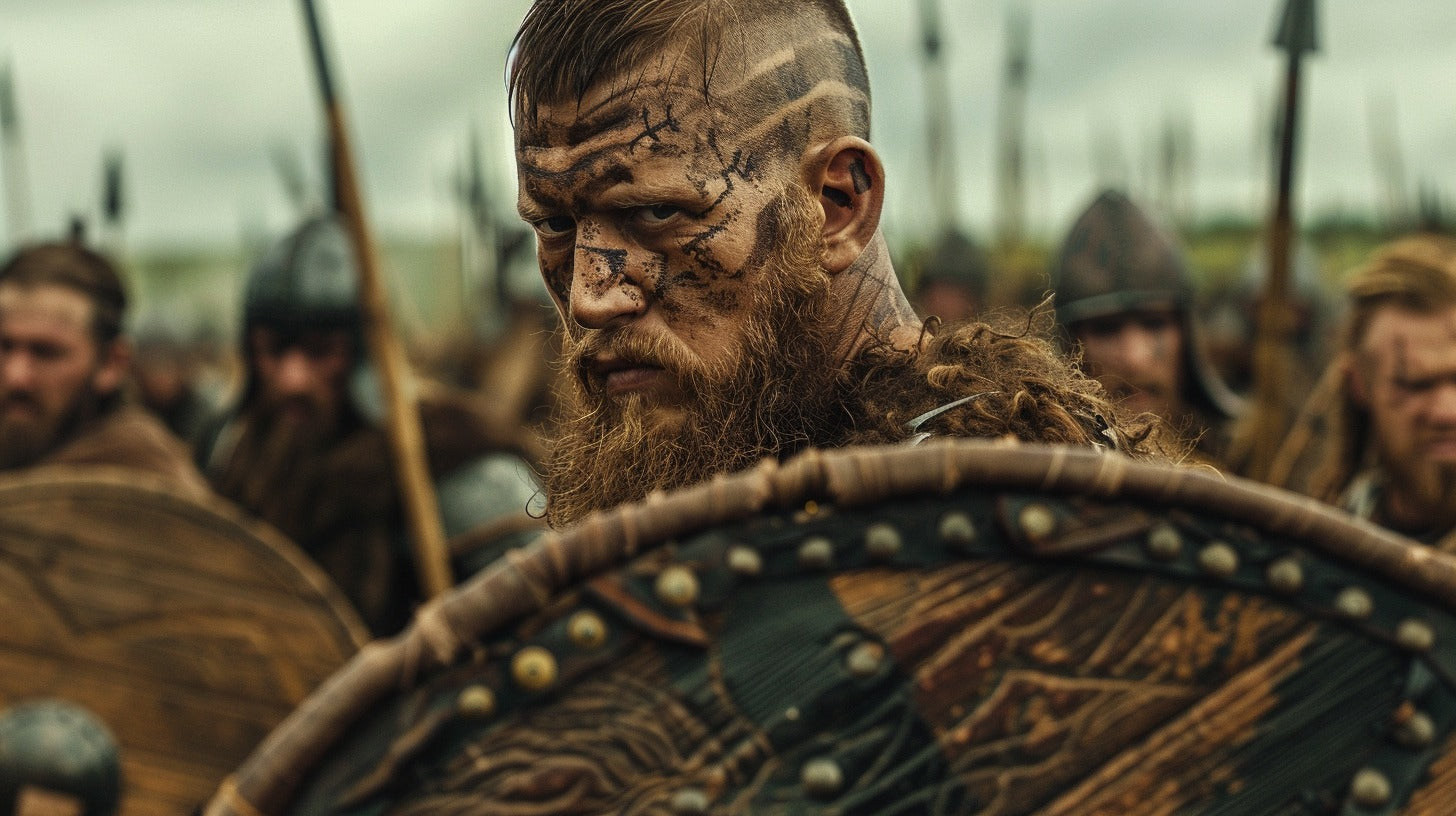
Ubba Ragnarsson: The Viking Warlord Who Avenged a King
Imagine a world where the clash of steel and the roar of battle cries echoed across the seas. A time when mighty warriors sailed in longships, their dragon-headed prows striking fear into the hearts of their enemies. In this age of Vikings, one name stands out among the rest: Ubba Ragnarsson. But who was this legendary figure, and why does his story continue to captivate us today?
Early Life and Background

A depiction of Ívarr and Ubba setting forth to avenge their father, Loðbrók, from folio 47v of British Library Harley 2278
Family Ties
Ubba Ragnarsson, as his name suggests, was the son of the infamous Ragnar Lodbrok, a legendary Viking hero and king. Born into a family of renowned warriors and rulers, Ubba was destined for greatness from the start. But what was it like growing up as the son of such a legendary figure?
Imagine being a young boy, listening to tales of your father's daring exploits and feeling the weight of expectation on your shoulders. That was Ubba's reality. He had big shoes to fill, and the pressure to live up to his family's reputation must have been immense.
Viking Culture and Upbringing
Growing up in the harsh Nordic environment, Ubba was immersed in Viking culture from birth. Picture a world where strength, courage, and skill in battle were prized above all else. From a young age, Ubba would have been trained in the art of warfare, learning to wield axes, swords, and shields with deadly precision.
But Viking life wasn't all about fighting. Ubba would have also learned about navigation, shipbuilding, and the intricate Norse mythology that shaped their worldview. Can you imagine spending your childhood learning to read the stars, mastering the art of sailing longships, and memorizing the tales of gods and giants?
Rise to Power

Military Prowess
As Ubba grew into adulthood, he quickly made a name for himself as a formidable warrior. His skill in battle was said to be unmatched, and he soon became known as one of the most feared Vikings of his time. But what set Ubba apart from other warriors?
It wasn't just his physical strength or fighting skills that made Ubba stand out. He was also a brilliant tactician, able to outmaneuver his opponents and lead his men to victory against seemingly impossible odds. Think of him as the Viking equivalent of a chess grandmaster, always several moves ahead of his adversaries.
Political Influence
Ubba's reputation as a warrior naturally led to increased political influence. In Viking society, strength and success in battle were often the keys to power. As Ubba's fame grew, so did his ability to sway decisions and gather followers.
Imagine being in a great hall, filled with grizzled warriors and seasoned leaders. Now picture Ubba standing up to speak, his voice carrying the weight of his victories and his lineage. When he talked, people listened – and that's how he began to shape the course of Viking history.
The Great Heathen Army

Formation and Purpose
The defining moment in Ubba's life came with the formation of the Great Heathen Army. This massive Viking force was assembled with a clear purpose in mind: to invade and conquer the Anglo-Saxon kingdoms of England. But what sparked this unprecedented military campaign?
The answer lies in a tragic event – the death of Ragnar Lodbrok, Ubba's father. According to the Norse sagas, Ragnar was captured and executed by King Ælla of Northumbria, thrown into a pit of venomous snakes. Can you imagine the fury and grief that must have consumed Ubba and his brothers, Ivar the Boneless and Halfdan, when they heard the news?
This wasn't just about conquest anymore. It was personal. The Great Heathen Army was formed as an act of revenge, with Ubba and his brothers vowing to avenge their father's death and make the Anglo-Saxons pay dearly for their actions.
Key Battles and Conquests

Invasion of East Anglia
The Great Heathen Army landed on English shores in 865 CE, and their first target was the kingdom of East Anglia. Ubba, along with his brothers Ivar the Boneless and Halfdan Ragnarsson, led the charge. The East Anglians, caught off guard by the size and ferocity of the Viking force, were quickly overwhelmed.
Picture the scene: longships appearing on the horizon, their dragon-headed prows striking fear into the hearts of the defenders. Ubba would have been at the forefront, his axe gleaming in the sunlight as he led his men ashore. The conquest of East Anglia was swift and decisive, setting the stage for further invasions.
Northumbrian Campaign
With East Anglia under their control, Ubba and his brothers turned their attention northward. Their ultimate goal? Northumbria, the kingdom ruled by Ælla, the man responsible for their father's death. The campaign against Northumbria was brutal and relentless.
Imagine the tension as the Viking army marched towards York, the Northumbrian capital. The clash of steel, the screams of the wounded, and the acrid smell of smoke filling the air as battles raged across the countryside. Ubba's tactical genius shone through in this campaign, as he outmaneuvered the Northumbrian forces time and time again.
The climax of the campaign came with the capture of York and the defeat of King Ælla. Legend has it that Ubba and his brothers subjected Ælla to a gruesome execution known as the "blood eagle" – a fitting revenge, in their eyes, for the death of their father.
Legacy and Impact

Influence on Anglo-Saxon England
The invasions led by Ubba and the Great Heathen Army had a profound and lasting impact on Anglo-Saxon England. They didn't just conquer territories; they reshaped the political landscape of the entire region. The once-powerful Anglo-Saxon kingdoms were left in disarray, paving the way for increased Viking settlement and influence.
Think of it as a domino effect. The fall of East Anglia and Northumbria weakened the other Anglo-Saxon kingdoms, making them more vulnerable to future Viking raids and invasions. Ubba's actions set in motion a chain of events that would eventually lead to the establishment of the Danelaw – a large area of northern and eastern England where Danish law and customs held sway.
Norse Sagas and Legends
Ubba's exploits didn't just change the course of history; they also became the stuff of legend. His deeds were recorded in various Norse sagas, ensuring that his name would be remembered for generations to come. But how accurate are these tales?
Like many legendary figures, the line between fact and fiction in Ubba's story is often blurred. The sagas paint a picture of a larger-than-life hero, blessed with almost superhuman strength and skill. While we can't take every detail at face value, these stories give us a glimpse into how Ubba was perceived by his contemporaries and later generations.
Imagine sitting around a fire on a cold Nordic night, listening to a skald (poet) recite the tales of Ubba's bravery and cunning. These stories weren't just entertainment; they were a way of preserving history and instilling cultural values. Ubba became a role model for young Vikings, embodying the ideals of strength, loyalty, and the importance of family honor.
Ubba's Final Days

Wind Hill, near Countisbury, Devon, possibly the site of the Viking defeat at the hands of local men in 878 / Image Credit: Steve Daniels, CC BY-SA 2.0
The Devon Campaign
One of the most intriguing and widely discussed accounts of Ubba's death places him in Devon, in the southwest of England. This story, primarily sourced from the Anglo-Saxon Chronicle and Asser's "Life of King Alfred," provides a dramatic and detailed narrative of Ubba's final battle.
According to these sources, in 878 CE, Ubba led a Viking fleet of 23 ships to the coast of Devon. His target was a fortification known as Arx Cynuit (possibly modern-day Countisbury Hill), where a group of King Alfred's thegns (noble retainers) had taken refuge. Picture the scene: longships appearing on the horizon, their dragon-headed prows cutting through the mist as they approach the rocky Devonshire coast.
The Siege of Arx Cynuit
Ubba, known for his tactical acumen, decided to lay siege to the fort rather than launch a direct assault. The Anglo-Saxon defenders found themselves in a precarious position. The fort, while naturally defensible due to its clifftop location, lacked a reliable water source. Ubba likely believed that thirst would soon force the defenders to surrender or attempt a desperate breakout.
However, the Viking leader may have underestimated the resolve and resourcefulness of his opponents. Imagine the tension building over days of siege, with both sides knowing that a decisive confrontation was inevitable.
The Fatal Battle
The Anglo-Saxon Chronicle describes a surprising turn of events. Instead of waiting to be starved out, the defenders, led by Ealdorman Odda of Devon, launched a pre-dawn attack on the Viking camp. Caught off guard, many Vikings were still asleep when the Saxon warriors fell upon them.
In the ensuing chaos and bloodshed, Ubba himself was said to have fallen. The Chronicle reports that 840 Vikings were killed in the battle, and the mysterious "Raven banner" – a magical standard said to have been woven by Ragnar Lodbrok's daughters – was captured.
Controversies and Doubts
While this account provides a dramatic end to Ubba's story, it's not without its controversies:
- Conflicting Sources: Not all sources agree on this version of events. Some Norse sagas make no mention of Ubba dying in Devon, leading to speculation that he may have survived this battle or never participated in it at all.
- Identification Issues: There's debate among historians about whether the "Ubba" mentioned in the Devon account is the same person as Ragnar's son. Some argue that it could have been a different Viking leader with the same name.
- The Raven Banner: The mention of the magical banner adds a legendary element to the tale, making some scholars question the accuracy of the entire account.
- Location Uncertainty: The exact location of Arx Cynuit remains a subject of debate, with several sites in North Devon proposed as possibilities.
Alternative Theories
Given these uncertainties, several alternative theories about Ubba's fate have emerged:
- Return to Scandinavia: Some suggest that Ubba may have returned to Denmark or another part of Scandinavia, living out his days there.
- Death in a Different Battle: There are theories that Ubba might have fallen in one of the many other conflicts of the Great Heathen Army, with his death in Devon being a case of mistaken identity.
- Later Life in the Danelaw: Another possibility is that Ubba settled in the Danelaw (the Viking-controlled parts of England) and lived a less eventful later life, which wasn't recorded in the chronicles.
The Impact of Uncertainty
The lack of consensus about Ubba's final days has had a fascinating effect on his legacy. Rather than diminishing his importance, the mystery has enhanced Ubba's legendary status. It has allowed for continued speculation and storytelling, keeping his memory alive in a way that a clear-cut historical record might not have.
This uncertainty also reflects the challenges historians face when dealing with figures from this period. The scarcity of reliable written sources, the biases of chroniclers, and the blending of history and legend all contribute to the difficulty in establishing definitive facts about characters like Ubba.
In the end, whether Ubba met his end on a Devon battlefield or elsewhere, his story remains a captivating part of Viking lore. The various accounts of his death – from the heroic last stand to the peaceful retirement – all add layers to our understanding of this complex historical figure and the turbulent times in which he lived.
Conclusion
Ubba Ragnarsson's life reads like an epic saga – a tale of revenge, conquest, and legendary feats. From his early days as the son of a famous Viking king to his role in leading the Great Heathen Army, Ubba left an indelible mark on history. His actions reshaped the political landscape of Anglo-Saxon England and contributed to the lasting influence of Viking culture in the British Isles.
While separating fact from fiction in Ubba's story can be challenging, there's no denying the impact he had on both his contemporaries and future generations. His legacy lives on in historical records, Norse sagas, and the imaginations of those fascinated by the Viking Age.
As we look back on Ubba's life, we're reminded of the complex and often brutal world of the Vikings – a world where honor, family, and the pursuit of glory drove men to extraordinary deeds. Ubba Ragnarsson stands as a testament to that era, a larger-than-life figure whose story continues to captivate and intrigue us to this day.
FAQs
- Was Ubba Ragnarsson a real historical figure?
While Ubba is mentioned in various historical sources and Norse sagas, the exact details of his life are often debated by historians. He is generally considered a real historical figure, but some aspects of his story may have been embellished over time.
- How many brothers did Ubba Ragnarsson have?
According to most sources, Ubba had several brothers, with the most famous being Ivar the Boneless and Halfdan Ragnarsson. However, the exact number of siblings varies depending on the source.
- Did Ubba Ragnarsson ever rule as a king?
While Ubba held significant power and influence, there's no concrete evidence that he ever ruled as a king in his own right. He was primarily known as a military leader and one of the commanders of the Great Heathen Army.
- What weapons did Ubba Ragnarsson use in battle?
As a Viking warrior, Ubba would likely have been skilled with various weapons common to the era, such as axes, swords, spears, and shields. However, no specific weapon is consistently associated with him in historical records.
- Are there any movies or TV shows featuring Ubba Ragnarsson?
While Ubba himself isn't often a central character, he has been portrayed in various adaptations of Viking history and legends. For example, he appears as a character in the TV series "Vikings," and "The Last Kingdom", though the portrayal may not be entirely historically accurate.
References
Forte, A., Oram, R., & Pedersen, F. (2005). Viking Empires. Cambridge University Press.
Haywood, J. (1995). The Penguin Historical Atlas of the Vikings. Penguin Books.
Jones, G. (1984). A History of the Vikings. Oxford University Press.
Keynes, S., & Lapidge, M. (1983). Alfred the Great: Asser's Life of King Alfred and Other Contemporary Sources. Penguin Classics.
Sawyer, P. (1997). The Oxford Illustrated History of the Vikings. Oxford University Press.
Smyth, A. P. (1977). Scandinavian Kings in the British Isles, 850-880. Oxford University Press.
Swanton, M. (2000). The Anglo-Saxon Chronicles. Phoenix Press.
Abrams, L. (1998). The Conversion of the Scandinavians of Dublin. Anglo-Norman Studies, 20, 1-29.
Downham, C. (2007). Viking Kings of Britain and Ireland: The Dynasty of Ívarr to A.D. 1014. Edinburgh: Dunedin Academic Press.
Richards, J. D. (2004). Viking Age England. Stroud: Tempus.